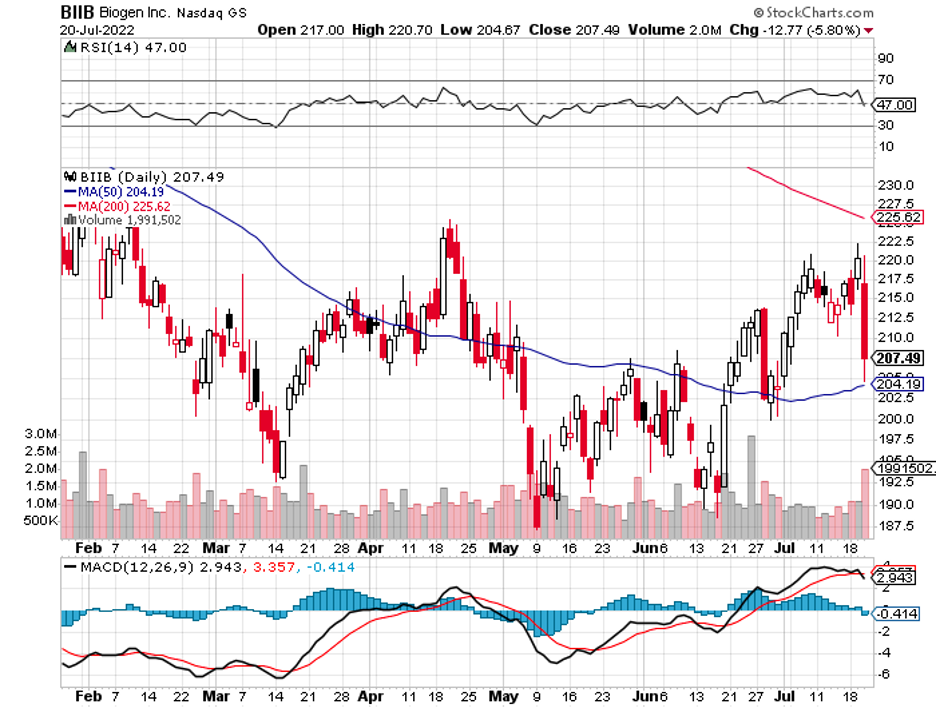A Bad News Buy Hype
Even when they’re on the dip, there are some stocks you should avoid. In a bear market, it’s always challenging to determine which stocks are good buys and which ones you should steer clear of at the moment.
Shares of biotechnology giant Biogen (BIIB) have plummeted by 40% in the past 12 months, clearly underperforming the broader market over the same period. While there are a lot of factors to consider, the drugmaker’s decline could be attributed to the controversial Alzheimer’s treatment Aduhelm.
Although Biogen’s shares are currently on sale, it doesn’t necessarily follow that the stock is a buy. So far, the company’s future still looks quite grim.
Admittedly, Aduhelm’s approval was an incredible milestone for the biotechnology industry. It was the first-ever FDA-approved Alzheimer’s disease therapy since 2003.
Unfortunately, it failed to live up to its potential. Actually, it didn’t even get close to fulfilling its promise.
Recapping the whole Aduhelm saga would take up more space than necessary, so here’s a quick rundown of the key events involving the controversial drug.
In June 2021, the FDA approved Biogen’s Aduhelm as an Alzheimer’s treatment.
The green light was a shock, especially since the FDA’s committee of experts adamantly voted against the drug, and the agency typically adheres to the group’s recommendations.
To appease the public, FDA required the biotech company to perform a post-approval study to re-confirm Aduhelm’s efficacy and safety. If the treatment fails, it must be taken off the market.
While Aduhelm became available commercially across the US by the second quarter of 2021, the drug failed to deliver on sales expectations. It only racked up a disappointing $3 million in revenue then.
By April 2022, the US Centers for Medicare and Medicaid Services (CMS) disclosed its coverage plan involving Aduhelm. It was limited to Alzheimer’s patients with mild cognitive impairment enrolled in clinical trials approved by CMS.
Biogen announced in May 2022 that it would drastically reduce its spending on commercial infrastructure focused on Aduhelm, owing in part to the CMS' limited coverage and possibly as a cost-cutting strategy. This move, which saved the biotech approximately $1 billion, reflects the company's loss of faith in Aduhelm and potential plans to abandon the project entirely.
Despite the Aduhelm fiasco, Biogen is still looking for Alzheimer's treatments.
The biotech completed a rolling submission to the for lecanemab in the same month it announced its decision to cut costs on Aduhelm infrastructures.
Lecanemab, which Biogen is developing alongside Esai (ESALY), is another Alzheimer’s therapy.
Lecanemab also works by getting rid of the beta-amyloid plaques in the brain. Understandably, it’s difficult to be too optimistic since it essentially has the same concept as Aduhelm.
Hence, Biogen needs a strong candidate to pull the company from this slump. Its revenue fell 6% year-over-year to $2.5 billion in the first quarter of 2022.
Biogen’s net income for the same period was $303.8 million, down from the $410.2 million it raked in the first quarter of 2021.
Most of Biogen’s revenue comes from its multiple sclerosis (MS) treatments. However, Tecfidera’s loss of exclusivity has allowed generic competition to chip away at their market share.
For context, the company’s total revenue from this segment in 2021 was $6.1 billion, which is 29% lower from 2020.
Meanwhile, Spinraza, another MS drug, hasn't experienced much growth either. In 2021, Spinraza recorded $1.9 billion in sales, falling by 9% from the $2.1 billion it reported in 2020.
Aside from its efforts in the Alzheimer’s and MS segments, Biogen also has other programs. It currently has 9 treatments queued for Phase 3 trials and several candidates for early-stage studies.
One promising prospect is its collaboration with Sage Therapeutics (SAGE). The two are working on zuranolone, which is a major depressive disorder treatment. The goal is to file for an NDA before 2022 ends and another NDA for postpartum depression by 2023.
Another prospect is its work on a biosimilar for Regeneron’s (REGN) top-selling macular degeneration therapy Eylea. This could lead to a lucrative market for Biogen since Eylea rakes in an average of $2.5 billion in revenues.
Needless to say, Biogen has so much riding on its pipeline programs. After all, it could no longer afford another spectacle like the Aduhelm episode. This is a critical reason that the stock is not looking attractively valued, particularly given the headwinds it’s facing.
Therefore, investors would be better off looking elsewhere right now. Declining revenues and earnings, exclusivity losses, growing competition, and no feasible catalyst on top of a struggling new product do not make any company—no matter how tumultuous the market—very attractive. Biogen may look cheap compared to other biotech and healthcare stocks, but it appears to have all the makings of a value trap.


